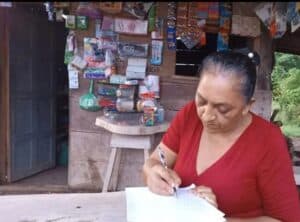Nobody Likes Diarrhea (Seriously)

Migdalia (right) alongside the resident doctor at a community meeting teaching the importance of the CTI-8
After a sweltering day spent working on a farm, Julio heads home longing for a cool drink of water. The water that runs from his kitchen tap is brown and contaminated, but he is exhausted and dehydrated: what choice does he have? For as long as anyone can remember in Jacinto Baca, the water has not been safe to drink and the people have been plagued with diarrhea for something as simple as quenching their thirst. In this rural community in northern Nicaragua, 145 houses are occupied by 1,053 people whose livelihoods are mostly agriculture, with the exception of a few small business owners, teachers, and health workers.
Migdalia María Obando is one of those health workers – a licensed nurse who is the head of the Health Clinic and has raised her two children in Jacinto Baca. A lifelong community member, she has witnessed and experienced personally the illnesses that come with consuming unsanitized water. In the past people were expected to sanitize their own water, which they did not always do, so diarrhea and stomach issues persisted in the community. They had grown so accustomed to living with the symptoms of contaminated water that they downplayed their health issues until the Ministry of Health examined and presented the high levels of contamination in the water.
Now, the water is chlorinated before it reaches the homes, so the water is clean and ready to drink as it exits the faucet. Migdalia says this change, thanks to the installation of the CTI-8 water chlorination device, has made all the difference, “As health workers, we have observed the importance of the CTI-8. Before there were many people sick with diarrhea, mainly children…now that we are using the chlorinator, the cases of diarrhea have decreased.” The inhabitants are educated on the changes brought by the CTI-8 and are asked to pay a small “water fee” to maintain the device and ensure that they will have clean water each month.

Bayardo displaying a sample of contaminated water examined my the Ministry of Health (MINAS)
The plumber in charge of maintaining the CTI-8 is Bayardo Antonio Hernández, who, like Migdalia, is raising his two children in Jacinto Baca and has witnessed their suffering after drinking water that was not potable. Stomach problems were often blamed on the heat in the past but after the Ministry of Health’s testing and the installation of the CTI-8, the stomach pains and diarrhea have practically disappeared.
Both Migdalia and Bayardo lived with the flawed water system in Jacinto Baca for over 30 years, so they are more than familiar with the problems it caused. Migdalia notes the benefits of the new CTI-8 chlorination device, “Now, we drink water feeling assured and without worry, and we have noted a change in our health, and in the records we keep at the Health Clinic we have reached a milestone achievement in the decrease in cases of diarrhea and water-related ailments. We will continue using the CTI-8 to better the health of all community members.”

Bayardo (red hat) overseeing the installation of the CTI-8
Since the installation, 1,053 residents of Jacinto Baca have received over 45,420 liters of safe drinking water every day.




